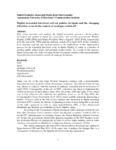Digital terrestrial television roll-out policies in Spain and the changing television scene in the context of analogue switch-off

Use este enlace para citar
http://hdl.handle.net/2183/17894Colecciones
- II - Artigos [569]
Metadatos
Mostrar el registro completo del ítemTítulo
Digital terrestrial television roll-out policies in Spain and the changing television scene in the context of analogue switch-offFecha
2010Cita bibliográfica
Fernández-Alonso, I. and Díaz-González, M.-J. (2010), ‘Digital terrestrial television roll-out policies in Spain and the changing television scene in the context of analogue switch-off’, International Journal of Digital Television1: 3, pp. 289–307
Resumen
[Abstract]: This article describes and analyses the digital terrestrial television roll-out polices developed and applied in Spain by conservative and socialist governments (Partido Popular [1996–2004] and Partido Socialista Obrero Español [2004–2010], respectively) from the end of the 1990s until the analogue switch-off in April 2010. It also considers, from national, regional and local perspectives, the implications of this digitalization process for the terrestrial television scene in Spain. Finally, it points to a number of pending public policy issues and potential market trends. As a result of this process, Spain has become one of the first large Western European countries with a predominantly terrestrial television model to switch off analogue broadcasts.
Palabras clave
DTT
Spain
Analogue switch-off
Broadcasting policy
Digitalization
Television market
Spain
Analogue switch-off
Broadcasting policy
Digitalization
Television market
Versión del editor
Derechos
© 2010 Intellect Ltd.
ISSN
2040-4182





